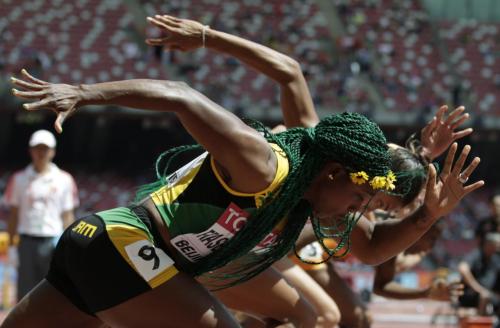Hold A Buoyant Sphere Like A Ping Pong Ball Underwater And Let It Go, And You’ll Find That The Ball

Hold a buoyant sphere like a ping pong ball underwater and let it go, and you’ll find that the ball pops up out of the water. Intuitively, you would think that letting the ball go from a lower depth would make it pop up higher – after all, it has a greater distance to accelerate over, right? But it turns out that the highest jumps comes from balls that rise the shortest distance. When released at greater depths, the buoyant sphere follows a path that swerves from side to side. This oscillating path is the result of vortices being shed off the ball, first on one side and then the other. (Image and research credit: T. Truscott et al.)
More Posts from Smparticle2 and Others

Wanting to feel productive, the grad student prints multiple articles with reckless abandon.

“People who never met her except across the footlights did not realize how, in her private life, she had such compassion and interest in everyone. After I returned from Hong Kong I was ill with a virus and she rang me up reproachfully later to say, ‘Why didn’t you let me know? I would have come and sit with you.’ Giving flowers to sick people is easy. Giving that precious commodity time is far more expensive for someone who had such a full life. But she always found time for everyone.” -Godfrey Winn





Shelly Ann Fraser Pryce “first ever” 3-time Golden World Champion… See i keep telling ppl’ A true Queen will always Rise & Shine!!! #Pryceless

How do you build a metal nanoparticle?
Novel theory explains how metal nanoparticles form
Although scientists have for decades been able to synthesize nanoparticles in the lab, the process is mostly trial and error, and how the formation actually takes place is obscure. However, a study recently published in Nature Communications by chemical engineers at the University of Pittsburgh’s Swanson School of Engineering explains how metal nanoparticles form.
“Thermodynamic Stability of Ligand-Protected Metal Nanoclusters” (DOI: 10.1038/ncomms15988) was co-authored by Giannis Mpourmpakis, assistant professor of chemical and petroleum engineering, and PhD candidate Michael G. Taylor. The research, completed in Mpourmpakis’ Computer-Aided Nano and Energy Lab (C.A.N.E.LA.), is funded through a National Science Foundation CAREER award and bridges previous research focused on designing nanoparticles for catalytic applications.
“Even though there is extensive research into metal nanoparticle synthesis, there really isn’t a rational explanation why a nanoparticle is formed,” Dr. Mpourmpakis said. “We wanted to investigate not just the catalytic applications of nanoparticles, but to make a step further and understand nanoparticle stability and formation. This new thermodynamic stability theory explains why ligand-protected metal nanoclusters are stabilized at specific sizes.”
Read more.










Dead Poets Society (1989)
Director - Peter Weir, Cinematography - John Seale
“Boys, you must strive to find your own voice. Because the longer you wait to begin, the less likely you are to find it at all. Thoreau said, "Most men lead lives of quiet desperation.” Don’t be resigned to that. Break out!“
Why Webb Needs to Chill
Our massive James Webb Space Telescope is currently being tested to make sure it can work perfectly at incredibly cold temperatures when it’s in deep space.
How cold is it getting and why? Here’s the whole scoop…
Webb is a giant infrared space telescope that we are currently building. It was designed to see things that other telescopes, even the amazing Hubble Space Telescope, can’t see.

Webb’s giant 6.5-meter diameter primary mirror is part of what gives it superior vision, and it’s coated in gold to optimize it for seeing infrared light.

Why do we want to see infrared light?
Lots of stuff in space emits infrared light, so being able to observe it gives us another tool for understanding the universe. For example, sometimes dust obscures the light from objects we want to study – but if we can see the heat they are emitting, we can still “see” the objects to study them.
It’s like if you were to stick your arm inside a garbage bag. You might not be able to see your arm with your eyes – but if you had an infrared camera, it could see the heat of your arm right through the cooler plastic bag.

Credit: NASA/IPAC
With a powerful infrared space telescope, we can see stars and planets forming inside clouds of dust and gas.

We can also see the very first stars and galaxies that formed in the early universe. These objects are so far away that…well, we haven’t actually been able to see them yet. Also, their light has been shifted from visible light to infrared because the universe is expanding, and as the distances between the galaxies stretch, the light from them also stretches towards redder wavelengths.
We call this phenomena “redshift.” This means that for us, these objects can be quite dim at visible wavelengths, but bright at infrared ones. With a powerful enough infrared telescope, we can see these never-before-seen objects.

We can also study the atmospheres of planets orbiting other stars. Many of the elements and molecules we want to study in planetary atmospheres have characteristic signatures in the infrared.

Because infrared light comes from objects that are warm, in order to detect the super faint heat signals of things that are really, really far away, the telescope itself has to be very cold. How cold does the telescope have to be? Webb’s operating temperature is under 50K (or -370F/-223 C). As a comparison, water freezes at 273K (or 32 F/0 C).
How do we keep the telescope that cold?
Because there is no atmosphere in space, as long as you can keep something out of the Sun, it will get very cold. So Webb, as a whole, doesn’t need freezers or coolers - instead it has a giant sunshield that keeps it in the shade. (We do have one instrument on Webb that does have a cryocooler because it needs to operate at 7K.)

Also, we have to be careful that no nearby bright things can shine into the telescope – Webb is so sensitive to faint infrared light, that bright light could essentially blind it. The sunshield is able to protect the telescope from the light and heat of the Earth and Moon, as well as the Sun.

Out at what we call the Second Lagrange point, where the telescope will orbit the Sun in line with the Earth, the sunshield is able to always block the light from bright objects like the Earth, Sun and Moon.

How do we make sure it all works in space?
By lots of testing on the ground before we launch it. Every piece of the telescope was designed to work at the cold temperatures it will operate at in space and was tested in simulated space conditions. The mirrors were tested at cryogenic temperatures after every phase of their manufacturing process.

The instruments went through multiple cryogenic tests at our Goddard Space Flight Center in Maryland.

Once the telescope (instruments and optics) was assembled, it even underwent a full end-to-end test in our Johnson Space Center’s giant cryogenic chamber, to ensure the whole system will work perfectly in space.

What’s next for Webb?
It will move to Northrop Grumman where it will be mated to the sunshield, as well as the spacecraft bus, which provides support functions like electrical power, attitude control, thermal control, communications, data handling and propulsion to the spacecraft.

Learn more about the James Webb Space Telescope HERE, or follow the mission on Facebook, Twitter and Instagram.
Make sure to follow us on Tumblr for your regular dose of space: http://nasa.tumblr.com.

“I came to America when I was six years old. Mom said she brought us here so that we’d have opportunities in life. She said that back in the Bahamas, it’s only the ‘haves’ and the ‘have nots.’ She wanted us to have more choices. But I don’t think she fully understood how things work here. She was a news reporter back in the Bahamas. But the only job she could get here was taking care of oldpeople. My dad could only work construction. We moved to four different states just so they could find work. They always told me, ‘Just study hard in school and everything will work out fine.’ So that was my plan. I got all A’s up until the 11th grade– except for one B in math. My goal was to get top twenty in my class, then go to college, then get a degree, and then get a job. I realized the truth my senior year. My guidance counselor told me I couldn’t get a loan. I couldn’t get financial aid. Even if I could find a way to pay for school, I probably couldn’t get a job. I felt so mad at everyone. There were some kids who completely slacked off in school, but even they were going to college. I started having panic attacks. My dad told me not to worry. He called me a ‘doubting Peter.’ He invited all his friends over to a fish fry to help raise money. And he did get $3,000. But that wasn’t enough. So I searched really hard on the Internet and found the Dream.us scholarship. My mom was so excited when I got it. They’re paying for me to go to Queens College. Now my mom’s really scared again because DACA got revoked. She’s crying all the time at work. I try to tell her that no matter what happens, we’re not going to die. We just might have to start over.”

Earlier this year, The Lutetium Project explored how microfluidic circuits are made, and now they are back with the conclusion of their microfluidic adventures. This video explores how microfluidic chips are used and how microscale fluid dynamics relates to other topics in the field. Because these techniques allow researchers very fine control over droplets, there are many chemical and biological possibilities for microfluidic experiments, some of which are shown in the video. Microfluidics in medicine are also already more common than you may think. For example, test strips used by diabetic patients to measure their blood glucose levels are microfluidic circuits! (Video and image credit: The Lutetium Project; submitted by Guillaume D.)



David Silverman @tubatron
1st appearance of Milhouse in 1st Butterfinger storyboard 11/18/1988 (missed the anni thing by a few weeks – )
-
 techjum reblogged this · 4 years ago
techjum reblogged this · 4 years ago -
 cerenecerenity-blog liked this · 6 years ago
cerenecerenity-blog liked this · 6 years ago -
 typicalspoon liked this · 6 years ago
typicalspoon liked this · 6 years ago -
 xivblack liked this · 6 years ago
xivblack liked this · 6 years ago -
 neutralfem liked this · 6 years ago
neutralfem liked this · 6 years ago -
 rat-daddy reblogged this · 6 years ago
rat-daddy reblogged this · 6 years ago -
 rat-daddy liked this · 6 years ago
rat-daddy liked this · 6 years ago -
 laurellynnleake reblogged this · 6 years ago
laurellynnleake reblogged this · 6 years ago -
 100percentreasontoremembertheurl liked this · 7 years ago
100percentreasontoremembertheurl liked this · 7 years ago -
 whalesandcraftbeers reblogged this · 8 years ago
whalesandcraftbeers reblogged this · 8 years ago -
 perhapsihavesucceeded reblogged this · 8 years ago
perhapsihavesucceeded reblogged this · 8 years ago -
 stefagreader reblogged this · 8 years ago
stefagreader reblogged this · 8 years ago -
 rezby reblogged this · 8 years ago
rezby reblogged this · 8 years ago -
 didyouseethisthing reblogged this · 8 years ago
didyouseethisthing reblogged this · 8 years ago -
 edwardcucken reblogged this · 8 years ago
edwardcucken reblogged this · 8 years ago -
 perhapsihavesucceeded reblogged this · 8 years ago
perhapsihavesucceeded reblogged this · 8 years ago -
 amaralikecamera reblogged this · 8 years ago
amaralikecamera reblogged this · 8 years ago -
 bradkey reblogged this · 8 years ago
bradkey reblogged this · 8 years ago -
 neon-ceiling reblogged this · 8 years ago
neon-ceiling reblogged this · 8 years ago -
 neon-ceiling liked this · 8 years ago
neon-ceiling liked this · 8 years ago -
 giancarloguillermo reblogged this · 8 years ago
giancarloguillermo reblogged this · 8 years ago -
 mrcorystraw reblogged this · 8 years ago
mrcorystraw reblogged this · 8 years ago -
 siriuslycrazy reblogged this · 8 years ago
siriuslycrazy reblogged this · 8 years ago -
 diabolicalnerd reblogged this · 8 years ago
diabolicalnerd reblogged this · 8 years ago -
 persistenceoffantasy liked this · 8 years ago
persistenceoffantasy liked this · 8 years ago -
 thingsmydadmightlike-blog reblogged this · 8 years ago
thingsmydadmightlike-blog reblogged this · 8 years ago -
 24hourcharleston liked this · 8 years ago
24hourcharleston liked this · 8 years ago -
 drala-fa reblogged this · 8 years ago
drala-fa reblogged this · 8 years ago -
 drala-fa liked this · 8 years ago
drala-fa liked this · 8 years ago -
 windowlicker liked this · 8 years ago
windowlicker liked this · 8 years ago -
 ellimist reblogged this · 8 years ago
ellimist reblogged this · 8 years ago -
 action-exclamation reblogged this · 8 years ago
action-exclamation reblogged this · 8 years ago -
 action-exclamation liked this · 8 years ago
action-exclamation liked this · 8 years ago -
 osanzo reblogged this · 8 years ago
osanzo reblogged this · 8 years ago -
 osanzo liked this · 8 years ago
osanzo liked this · 8 years ago -
 promptoargentbutt-blog reblogged this · 8 years ago
promptoargentbutt-blog reblogged this · 8 years ago -
 totalmoron liked this · 8 years ago
totalmoron liked this · 8 years ago -
 flashbeads reblogged this · 8 years ago
flashbeads reblogged this · 8 years ago -
 gracefully-gauche liked this · 8 years ago
gracefully-gauche liked this · 8 years ago -
 chillgamesh-the-swing reblogged this · 8 years ago
chillgamesh-the-swing reblogged this · 8 years ago -
 songbird-with-a-sore-throat reblogged this · 8 years ago
songbird-with-a-sore-throat reblogged this · 8 years ago